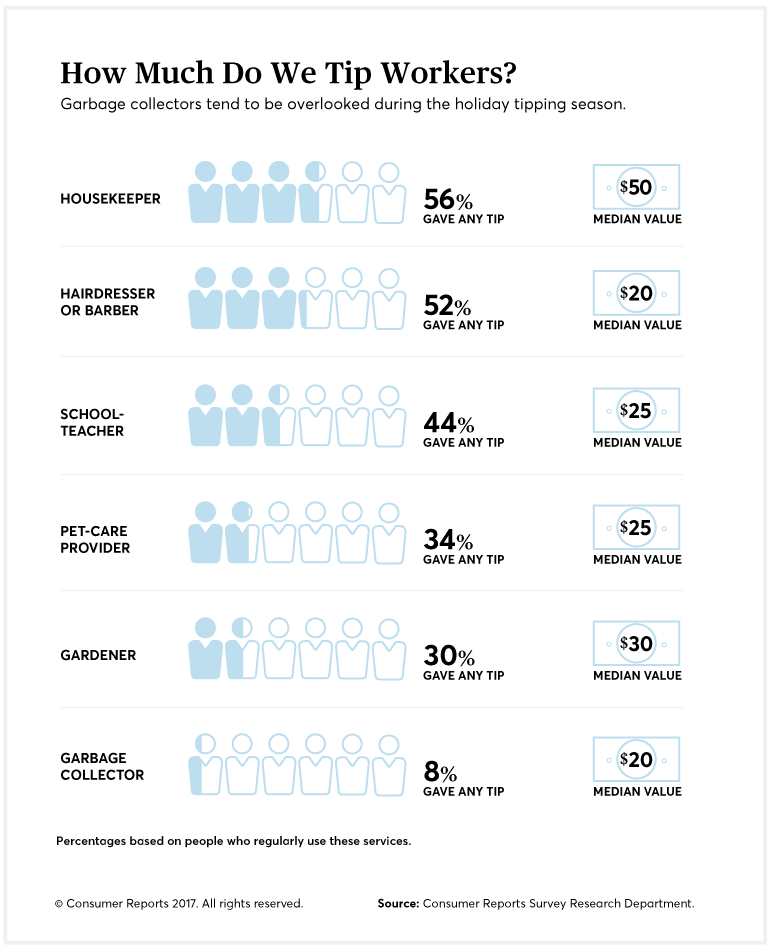It's the age old question: who am I tipping and how much should I give? Especially during the holidays! These are questions consumers grapple with every year, and there’s really no clear-cut answer. We did, however, put together a little Tip Sheet (no pun intended...) for tipping over the holiday season.
According to the Consumer Reports 2017 national survey on holiday tipping, only 50 percent of Americans gave tips during the holidays last year, down from around 60 percent five years ago. Among those most likely to receive a tip were housekeepers and hairdressers. Gardeners and garbage collectors were least likely to get a tip.
Housekeepers were even more fortunate—they also received the largest gratuities. Their median annual tip came to $50 last year. Hairdressers and garbage collectors were on the lower end of the spectrum, each receiving a median tip of $20.
Overall, Americans doled out an average of $40 in total tips during the 2016 holiday season. (When it comes to holiday tipping, find out who gives the most and the least.)
When considering how much to give, etiquette and tipping experts say a good place to start is to consider an amount equivalent to the cost of one service. If you feel you’ve received exemplary service throughout the year, you can then add to that base amount.

Who to Consider Tipping
Deciding who to tip doesn’t need to be complicated, says Daniel Post Senning, the great-great-grandson of etiquette maven Emily Post and a spokesman for the Emily Post Institute.
“To simplify the process, just consider service providers in key areas of your personal life,” he says.
Such people may include those who take care of your family, such as a nanny or health aide, as well as those who take care of your home, like a housekeeper or handyman. You can also consider giving to those who help you look good and stay healthy, such as a stylist, barber, or personal trainer.
Where you live can also have an impact on who you tip. Senning, who lives in rural Vermont, tips the person who plows his driveway when it snows. For someone in southern Florida, though, the tip may go the person cleaning the swimming pool.
New Yorkers and other urban dwellers often grapple with how much to tip a doorman. There is no clear answer, but Leslie Yazel, editor of the magazine Real Simple, says tips can vary from $20 to $100, depending on location, the type of building, and the level of service provided.
Those You May Not Want to Tip
Senning points out that in some cases it’s inappropriate to tip. “Be careful when it comes to salaried professionals,” he says. “Nurses and doctors, for example, are professionals you shouldn’t tip.”
How about teachers? Consumer Reports’ survey found that 44 percent of people with school-aged children gave teachers a holiday gift. That, however, is not always such a good idea. “You don’t want to create the impression of any tit-for-tat, or that you’re paying somone who is grading your kids,” Senning says.
He advises that you check the gift-giving policy at your child’s school before giving teachers a present. If it’s okay with the school, Senning recommends collecting money for a gift that’s from the entire class. “Make sure it’s clear that the gift comes from everyone, whether they’ve contributed or not,” he says. “The same goes in the office if you’re planning to give a gift to the boss.”
How to Avoid Awkwardness
The sense of obligation can feel stressful and awkward to many people, Senning says.
However, there are ways to ease your jangled nerves. “Rather than looking at tipping as an obligation, we should think of it as an opportunity to honor the people that make our lives better,” Senning says.
You can also make the process easier if you consider ahead of time how much tip to give. Yazel and Senning both say to consider giving the equivalent of the cost of one service—so for a housekeeper, it would be one day’s pay. Then you can tweak that amount to reflect the level of service given over the past year.
If you feel awkward giving cash, Yazel says that giving a gift card can be a good alternative. Another idea: Senning says that you can consider sending a gift basket or a tin of cookies. Because those gifts can be shared, they’re especially useful in places where a number of workers provided you with service.
More Tipping Advice
- Be aware that the U.S. Postal Service restricts the gifts that mail carriers can accept. Presents worth up to $20 are fine, but carriers can’t accept cash.
- Don’t give food unless you’re certain the recipient can eat it. With many people changing to more restrictive diets, your symbol of generosity might end up regifted or thrown out. Similarly, not every recipient would appreciate wine or spirits as a gift.
- If you’re giving cash, go to your bank to get nice, crisp bills, which present better and show a bit more effort on your part.
- If you really can’t afford to buy a gift or give cash—and don’t feel you have the talent or time to bake or make a gift—a heartfelt note of thanks is better than no recognition at all. As Senning points out, money isn’t everything. “We like to say that holiday tipping is really holiday thanking,” he says.
